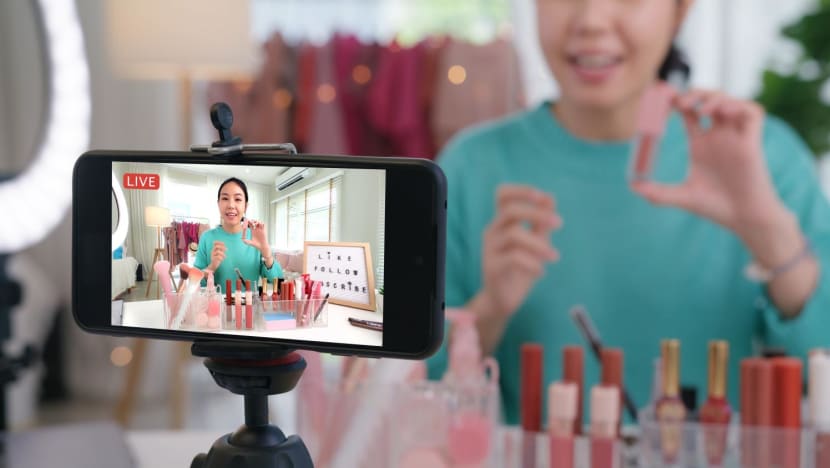Commentary: Generation dupe - why Gen Z admits to buying knockoff goods
Showing off purchases of imitation products bought cheaply is a way for young consumers to thumb their nose at convention, says Erin Lowry for Bloomberg Opinion.


This audio is generated by an AI tool.
NEW YORK: Parents of Gen Z might be surprised to find knockoffs on their children’s wish lists this holiday season. More affectionately called "dupes", cheap imitation purses, beauty products and other items have become all the rage with Gen Z and younger millennials.
Buying knockoffs is a tradition going back generations, but the new twist is publicly outing yourself as owning and wearing them.
The public embrace of dupes offers an interesting look into the Gen Z psyche. On one hand it would seem dupes go against Gen Z’s reputation for conscious consumption, ready to boycott a company for any indiscretion.
On the other hand, dupes themselves can be viewed as subversive, seemingly undercutting expensive brands, and even capitalism itself. Owning up to acquiring a dupe also is a form of information sharing, another Gen Z virtue.

I first heard the term dupe a couple years ago. I wanted to thank a friend for her help on a project, but instead of taking a guess at what this finicky friend would want, I asked her.
“I love Diptyque’s Feu de Bois candles, but you can easily find a dupe,” she told me.
A kind heads up, because Diptyque’s smallest, 70g candle sells for US$42. When I googled “Diptyque dupes”, I found dozens of posts for legitimate products with a similar fragrance to the Diptyque version.
DUPES STOP SHORT OF ACTUAL COUNTERFEITING
To be clear, vendors weren’t trying to pass off the products as the real thing. Unlike replicas, which attempt to be indistinguishable from well-known brands, dupes tend to be close approximations that stop short of actual counterfeiting. For example, dupes generally don’t copy trademarked logos or other brand-unique details used in original items.
TikTok, Instagram and other social media services have aided the proliferation of dupes. Creators use the platforms to post reviews and tips about dupe products as well as offer links to followers about where to make the purchase.
Some creators might get a small commission each time a shopper clicks a link from their page to purchase a product. TikTok even launched TikTok Shop earlier this year, which made it easier for creators and small businesses to allow users to shop right from the app. Both Instagram, a unit of Meta Platforms, and TikTok, owned by ByteDance, have policies prohibiting the sale of counterfeit goods.
The proliferation of dupes can be a problem for luxury brands that use exclusivity as part of their business model.
The Hermes Birkin and Kelly bags are notoriously difficult to buy directly from the retailer and have waiting lists that can be years long. The rise of social media influencers carrying bags that at a glance look similar to the originals could damage the brand’s ability to make the product seem scarce.
AT ODDS WITH ENVIRONMENTAL AND SOCIAL RESPONSIBILITY?
Most generations have some level of “stick-it-to-the-man” ethos in their teens and twenties. Gen Z is at the right age for wanting to challenge institutions and reject the way their elders have behaved, and dupes allow them to do that.
At the risk of sounding older than I am, back in my day we tried to play off dupes as the real thing and rarely would have admitted to buying imitations. Today, that behaviour might be labelled "gatekeeping".
The term is used to admonish anyone who withholds information or access from the majority. Publicly sharing dupes is certainly one way to grant access. And what better place for Gen Z to share information than on TikTok?
TikTok, however, is not where dupes were originally popularised. Beauty YouTubers are often credited with launching the term dupe.
After all, trying to find a cheaper but effective version of a high-end lotion, lipstick or eyeshadow makes sense. You just need something that’s effective because you aren’t touting the logo around town. It doesn’t matter if it’s a drugstore brand or US$250 a bottle.
The popularity of dupes can seem at odds with a desire among many younger consumers to prioritise environmental and social responsibility. But Gen Z isn’t a monolith, and even socially conscious consumers might see social value in the power of dupes to democratise luxury goods for the masses.
The real question is whether Gen Z will fall in line as generations have before to purchase the real version of designer goods once their financial status catches up with their tastes.

















